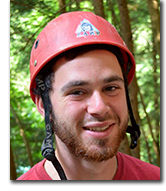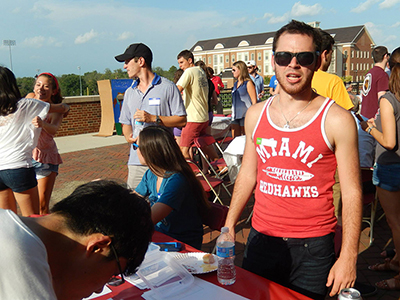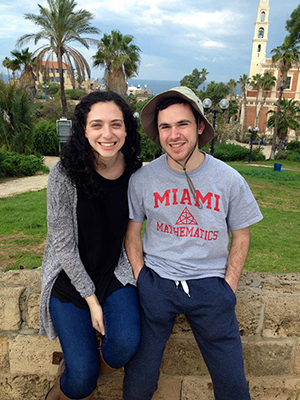Cody Philips (Class of 2017)

- honors junior Mathematics and Statistics major with an Analytics co-major
- minor in Actuarial Science
- from Bexley, OH
- worked on a predictive modeling project for Miami's Office of Admission to help forecast student transfers
- traveled to Israel to improve his Hebrew language skills during Winter Term 2015
"I don't feel that I am training for a career so much as life overall. In my personal philosophy, a university should prepare you with knowledge that is applicable to many of the things that you want to do in your life."
Why Miami?
"When I was looking at colleges, I was very interested in the actuarial science-related programs. During my senior year of high school, I realized that my focus shouldn't be closed off towards just being an actuary, however—I realized that I didn't want to be trained with just one major skillset. Math and statistics just became something that stood out to me as a very interesting field.
"My main reason for being here at Miami is for the academics, but it's a different sort of place than what I was used to as a kid. I grew up in a small, suburban town with kids of mainly Jewish descent that all had a little community together; going to the local coffee shop, you would see someone you knew. At Miami, there are many different ideas and opinions, including what people want to do with their lives.
“For example, one of my friends here wants to join the Peace Corps when he graduates, and another one of my friends is a math major but just wants to start a coffee shop, and other friends just want to travel the world for a couple of years. So many people have so many different ideas of what they want to do, and always feel fortunate to have that sort of diversity all around me."
Best Miami Experiences
"In high school I was very involved in a few organizations that frequently took me away from home, and I went to summer camp every summer, so I was used to being on my own. I have a great relationship with my family, so the transition wasn't hard. Being an honors student, I lived in one of Miami's honors dorms, which was really nice because that led me to meet a lot of friends who had similar interests and concentrations. One of my best friends, for example, is also a math-stat major with an actuarial science minor, and we had a great relationship from the start.

Cody Philips welcomes students at the annual Hillel Kosher Barbecue.
"I have also had some great classes, such as my Stats 467 class, 'Intro to Statistical Learning,' which was mostly made up of grad students. We had an incredible final project focused on predictive modeling, statistical predictive modeling, and machine learning. We were assigned to help Miami's admissions office essentially predict whether a student transfers after their first semester or not. We looked at BannerWeb (while keeping the students' confidentiality) and plugged the data into all sorts of statistical models and techniques. We found that Miami has a 90-something percent return rate after freshman year, and admissions was interested in improving that. We often had to 'clean the data' because a lot of people will say something in different ways. It was a lot of getting in there and thinking about these interesting issues.
"One of the biggest predictor of student transfers is ACT scores, but some people don't have those, such as international students. Because of this, we had to think of different, alternative models to use. For example, some people's high schools gave them GPAs of 9.2 or something! It was interesting, because how what do you do with that kind of data? How do you account for it? We collaborated together to try our best to work through various models using existing algorithms, and it was a great experience."
Campus Participation in Hillel and Study Abroad in Israel
"Since last year I've been serving on the executive board of Hillel, the Association of Jewish Students, here on campus. I've also been helping to plan and market events for the group and incorporate them on campus. We bring bring in various speakers, many of whom are Jewish historians, and that is often connected to the Department of History as well.
"I've also been really happy to have the experience of traveling abroad to Israel and speaking Hebrew, which I had taken for 4 semesters at Miami to fulfill the CAS language requirement. It was a lot of fun to try and speak Hebrew abroad, although most of the time the Israelis figured I was American so just spoke to me in English!

Cody Philips and friend pose in front of some historical landmarks in the old city of Jaffa, Israel.
"I've found that there is so much to be gained from learning a language. It allows you to get a sense of creativity and really encourages you to learn about a different culture. You also come to understand that there are all kinds of ideas and topics that exist in another language that don't even have counterparts in English, so some words are simply untranslatable.
"This especially was interesting when I was out with a bunch of friends I had made during the trip. It was the Jewish holiday of Hanukkah, and the bartender stopped the music to buy everyone drinks and say l'chaim. This phrase was popularized by the musical Fiddler on the Roof and literally means 'to life'. In Israel some might use this phrase sarcastically, but truly it has abundant meaning, and one could write essays about the true meaning of l'chaim. Every day the Israeli people experience bombings, stabbings, and other terror attacks of some sort, and throughout all this they remind themselves that the most beautiful thing in this world is life. It's important to always remember this; we often take our security for granted in the US.
"Another interesting expression is yallah, which essentially means 'to hurry up'. Israelis often shout yallah at you if they need to get somewhere quickly. They're often in quite a hurry and typically are not the most well-mannered individuals, and sometimes I find myself using the word here at home!"
Miami and Liberal Arts Education
"Liberal arts majors are able to critically analyze information and ask the right questions by learning things in-depth. For example, after studying Hebrew at Miami for four semesters, I had the opportunity to travel to Israel for about two weeks during J-Term 2015. Of course, there was no connection between Hebrew and my math and stats major, and there are students who say that learning a language is never going to be relevant to their career goals. That notion is just false. There are so many things that can have a more indirect relevance to you, both professionally and beyond.
"I don't feel that I am training for a career so much as life overall. In my personal philosophy, a university should prepare you with knowledge that is applicable to many of the things that you want to do in your life. It's the same way that I feel about exams—people often train for a specific career, but in the end we have to ask ourselves, did I really learn that much? Taking the linear approach feels too much like a trade, and you won't be learning how to think critically or analyze.
Having said that, my main career goal is to become a data scientist, and I've already begun looking at some opportunities. A lot of companies hire data scientists to analyze generated data and write mathematical algorithms for it. A prime example of this is in the healthcare industry, where I think I can be very helpful. I'm still considering becoming an actuary, since I've already taken an exam and will be taking another, but I like to keep some alternatives in consideration."
Advice to Students
"Don't be prejudiced towards a certain course or subject. Many people are blinded by ideas of what they think and what they know, or what they want to know or believe that a particular class is going to be.
"I'm a student teacher for calculus, so I teach review sessions for calculus courses and love it, but there was one student who said to me, 'I just don't know how this will be relevant to me today.' I got really mad, telling him that the course is relevant to anything he does, especially for engineering, but the direct relevancy just shouldn't even matter!
"In other words, don't expect that a stats class will be like any specific math class, or vice versa. Don't come in with any particular, inflexible idea of what any class will be like. Not being able to know everything is okay—in fact, that's actually one of the exciting things about mathematics and statistics!"
[September 2015]

